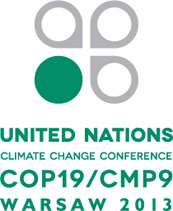 The 19th Session of the Conference of Parties to the UN Framework Convention on Climate Change, held in Warsaw from November 11 to 23, was designed to bring the international community one step closer to the development of a new international agreement to address climate change. Representatives from the 195 Parties to the UN Framework Convention on Climate Change (UNFCCC) met to discuss current challenges and future plans concerning climate change. Ongoing disagreements between developed and developing nations on the appropriate apportionment of responsibility for the consequences of climate change limited the progress made. Despite these setbacks, Parties at the conference reached several noteworthy agreements including a plan for advancing the Durban Platform, an international mechanism for loss and damage associated with climate change impacts and an agreement to slow deforestation.
The 19th Session of the Conference of Parties to the UN Framework Convention on Climate Change, held in Warsaw from November 11 to 23, was designed to bring the international community one step closer to the development of a new international agreement to address climate change. Representatives from the 195 Parties to the UN Framework Convention on Climate Change (UNFCCC) met to discuss current challenges and future plans concerning climate change. Ongoing disagreements between developed and developing nations on the appropriate apportionment of responsibility for the consequences of climate change limited the progress made. Despite these setbacks, Parties at the conference reached several noteworthy agreements including a plan for advancing the Durban Platform, an international mechanism for loss and damage associated with climate change impacts and an agreement to slow deforestation.
The State representatives made some progress toward the development of a new climate change convention by 2015. States agreed to “initiate or intensify domestic preparation for their intended national contributions towards that agreement” and to the extent that they are ready, provide “clear and transparent plans” before 2015. [UNFCCC] However, many States and members of civil society felt that the outcomes were insufficient to achieve the objectives outlined in the Durban Platform. In a public expression of dissatisfaction, nearly 800 people from NGOs such as Greenpeace staged a walk-out in protest of the lack of progress achieved at the conference. [ClimateProgress]
Additionally, in an unprecedented move, 133 of the world’s poorest nations walked out during talks concerning the new international mechanism for loss and damage associated with climate change impacts. [RT] Representatives of the countries that abandoned the discussion expressed their regret at the unwillingness of developed nations to accept financial responsibility for the damage caused by climate change. The United States, the European Union, and Australia, in particular, vocalized their desire to postpone the discussion of who should pay compensation for extreme weather events until 2015. [GlobalDevelopment]
Eventually, States approved the creation of a loss and damages mechanism that will “provide most vulnerable populations with better protection against loss and damage caused by extreme weather events and slow onset events such as rising sea levels.” [UNFCCC] To meet the outlined objectives, the mechanism will provide resources and education on comprehensive risk management approaches, coordinate action and dialogue among stakeholders, and facilitate the provision of financial, technical and other forms of support to affected countries. [UNFCCC] Notably, the final version places no specific financial obligations on developed States. [Guardian] Many developing nations and environmental advocates objected that no deadline or amounts were specified with regard to richer countries’ obligations to cover losses and damages, or for the budget of the Green Climate Fund, intended to help poorer countries address the consequences of climate change. [NYT]
The agreements reached in Warsaw also included decisions on the Reducing Emissions from Deforestation and Degradation plus pro-forest activities initiative (“REDD+”). The U.S., UK, and Norway committed USD $280 million to the program, which will work to reduce emissions from deforestation and forest degradation in developing countries. [UNFCCC] In particular, the money, which came from existing climate aid funds, will be used to support the sustainable use of land. [Guardian]
The 20th Session of the Conference of Parties to the UNFCCC will be held in Lima, Peru from December 1-12, 2014 and the 21St Session in Paris from November 30 to December 11, 2015. [UNFCCC] At these sessions, the parties will work towards the adoption of a new international legal instrument on climate change, intended to enter into effect in 2020, to replace the expiring Kyoto Protocol. [NYTimes] United Nations Secretary General Ban Ki-moon has also invited Heads of State and representatives from business, finance, and civil society to a Climate Summit in New York in September 2014.
